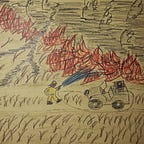Is the story of your life saturated with the felt need for you to atone for something?
All of us are thirsting for redemption in one way or another.
All of us are constantly making mistakes and failing other people, out of ignorance and malevolence; we all do damage to others who we’re in relationships with.
Do you feel like you’re wandering through a desert that’s evaporating your soul and exhausting your body?
Has your river run dry, because you’re loving to live a lie? Are you running further into that desert, away from the responsibility of what you’ve done, away from life?
This isn’t something to be taken lightly; people can turn away from the consequences of what they’ve done and never come back. They can turn their back on the meaning and value that honesty, redemption, and renewal could have in their lives.
Is it possible that on a deep level life itself has withdrawn support from you because you’re suppressing its clear calls to make amends for something you’ve done? That’s a disturbing possibility, and one that I think it’s safe to say is true of all of us in one way or another, at one time or another.
In what ways might it be true of you, right now?
Have there been moments in your life where there wasn’t the thickness of a sheet of paper between the right and wrong move, and you know you chose wrong? Where you felt like you were stumbling through darkness, doing the best you could, with not even the width of a hair between the right choice and the wrong one, and you know you made the wrong one?
It’s hard to see a hair in the dark, but growing bitter towards existence for its complexity, ambiguity, and arbitrariness doesn’t help you atone for what you’ve done.
Is there someone you feel alone with, even when you’re together with them? Like there’s a distance between you, because of something you’ve done?
It’s possible that you need to make atonement for something in your life.
But how can you even begin to move in that direction after making a huge mistake that you still regret?
Endlessly torturing yourself isn’t a good option, and what makes you so sure of the story you probably keep telling yourself about how the possibility of reconciliation is just a mirage that’s teasing you?
Why don’t you try doubting your doubt, and see where that leads you?
Writing can help you take the first steps.
First, you have to be brutally honest about whether you actually regret doing what you did to the other person, or do you just regret the negative impact it’s had on you?
Say that you do feel genuinely guilty about it; you’ve admitted it was wrong, by your own standards.
Now that you know it was a mistake, do your best to understand the origin of it:
-Why were you so clueless and ignorant of it being a mistake at the time?
-Where, exactly, did things begin to go wrong?
It’s very difficult to identify problems accurately, but it’s also critical in order to have the best idea of what to do, so include every single decision you can remember, with as much detail as possible.
Imagine you’re trying to follow a trail and you get lost; you need to figure out exactly where you wandered off the trail.
Say you’ve had an extra-marital affair with someone, and this has destroyed your relationship with your spouse. When you first met the person you had an affair with, did you start to flirt with them in a way that you knew was over the top?
Whatever the case, you had the affair; now you have to figure out exactly why you thought it was a good idea at the time.
The purpose of exploring your mistakes with as much precision as possible is so that you can find your way back to the trail, and so that you don’t get lost again when you’re back on the trail. If you got lost once, you need to be wary of getting lost in that same way again.
-Why are you prone to getting lost in that way?
-What was wrong with your perception and your beliefs that lead you off the trail to begin with?
Drill down to the most painful levels of detail possible, because you’re trying to not get lost like that ever again.
Once you figure all this out to the best of your ability, try to stop torturing yourself about it. Instead, focus on the progress you’ve made towards trying to learn your lesson, because now your focus needs to shift to what you can do to put things right.
Maybe that means going around and making amends to every person that you hurt.
Writing can help you prepare for this too:
-Who have you hurt?
-How do you think they’ve been dealing with that over time?
-How would you feel if you were in their position?
-How would you want to be treated now, if you were them?
Don’t be afraid to step back and ask:
-Do I even know what reconciliation between us would look like?
-What questions should I ask them about what I did before I even try to set things right?
Exploring all these questions through writing can help to inspire and encourage you to try to put things right with those people, and can get you back on the trail in a frame of mind focused on staying on the trail as best you can.
Ten thousand years won’t save your life, but writing can help you make atonement before you depart.
And who can say, the meaning of that might end up being worth everything ever wished for.
